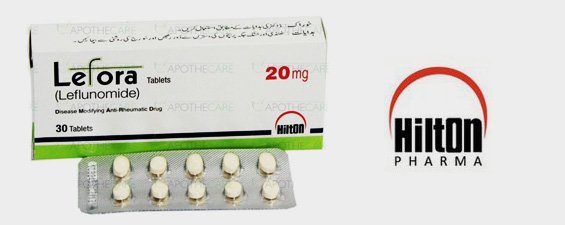- Lefora 10mg Tablet Contains
Leflunomide 10mg - Lefora 20mg Tablet Contains
Leflunomide 20mg
What is Lefora Used For?
Lefora is Indicated in adults for the treatment of active rheumatoid arthritis (RA) to reduce signs and symptoms and to retard structural damage as evidenced by X-ray erosions and joint space narrowing.
Aspirin (e.g. Ascard), nonsteroidal anti-inflammatory agents and/or low dose corticosteroids may be continued during treatment with Lefora Tablets. The combined use of Lefora with anti-malarial drugs, intramuscular or oral gold, D penicillamine, azathioprine, or methotraxate has not been adequately studied.
How Lefora Works?
Lefora is an isoxazole immunomodulatory agent which inhibits dihydroorotate dehydrogenase (an enzyme involved in de novo pyrimidine synthesis) and has anti-proliferative activity. Several in vivo and in vitro experimental models have demonstrated an anti-inflammatory effect.
Following oral administration, Lefora Tablet (leflurtomide) is metabolized to an active metabolite A77 1726 (hereafter referred to as M1) which is responsible for essentially all of its activity in vivo. Plasma levels of Lefora are occasionally seen at very low levels. Studies of the pharmacokinetics of leflunomide have primarily examined the plasma concentrations of this active metabolite.
Recommended Dosage of Lefora Tablets
- Loading Dose
Due to the long half-life in patients with Rheumatoid Arthritis and recommended dosing interval (24 hours), a loading dose is needed to provide steady-state concentrations more rapidly. It is recommended that therapy with Lefora Tablets be initiated with a loading dose of 100 mg tablet per day for 3 days. - Maintenance Therapy
Daily dosing of 20 mg is recommended for treatment of patients with Rheumatoid Arthritis. Doses higher than 20 mg/day are not recommended. If dosing at 20 mg/day is not well tolerated clinically, the dose may be decreased to 10 mg daily. Liver enzymes should be monitored and dose adjustments may be necessary. Due to the prolonged half-life of the active metabolite of Lefora (leflunomide), patients should be carefully observed after dose reduction, since it may take several weeks for metabolite levels to decline.
Side Effects of Lefora
Most common side effects associated with Lefora therapy include diarrhea, elevated liver enzymes, alopecia and rash.
Lefora during Pregnancy and Lactation
Pregnancy should be avoided during treatment with Lefora. If pregnancy is planned, follow the drug elimination procedure.
Lefora should not be used by nursing mothers. It is not known whether leflunomide is excreted in human milk. Many drugs are excreted in human milk and there is a potential for serious adverse reactions in nursing infants from Lefora. Therefore, a decision should be made whether to proceed with nursing or to initiate treatment with Lefora, taking into account the importance of the drug to the mother.

Leave A Comment